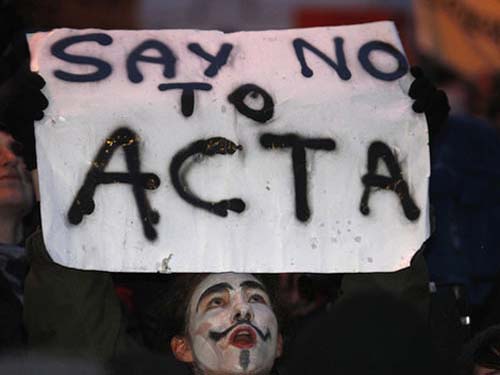The EU’s highest court has been asked to rule on the legality of ACTA, the controversial anti-piracy agreement.
The Anti-Counterfeiting Trade Agreement (ACTA) has been criticized by rights campaigners who argue it could stifle free expression on the internet.
European Union trade head Karel De Gucht said the court will be asked to clarify whether the treaty complied with “the EU’s fundamental rights and freedoms”.
The agreement has so far been signed by 22 EU member states.
The European Commission said it “decided today to ask the European Court of Justice for a legal opinion to clarify that the ACTA agreement and its implementation must be fully compatible with freedom of expression and freedom of the internet”.
Several key countries, including Germany and Denmark, have backed away from the treaty amid protests in several European cities.

ACTA is set to be debated by the European Parliament in June.
While countries can individually ratify the terms of the agreement, EU backing is considered vital if the proposal’s aim of implementing consistent standards for copyright enforcement measures is met.
As well as the 22 European backers, the agreement has been signed by the United States, Japan and Canada.
Karel De Gucht told a news conference on Wednesday: “Let me be very clear: I share people’s concern for these fundamental freedoms… especially over the freedom of the internet.
“This debate must be based upon facts, and not upon the misinformation and rumour that has dominated social media sites and blogs in recent weeks.”
However, Karel de Gucht went on to say that the agreement’s purpose was to protect the creative economy.
“[ACTA] aims to raise global standards for intellectual property rights,” he said, adding that the treaty “will help protect jobs currently lost because counterfeited, pirated goods worth 200bn euros are currently floating around”.
ACTA’s backers face strong opposition within the EU. Viviane Reding, the commissioner for justice, fundamental rights and citizenship, took to Twitter to outline her worries on the treaty.
“For me, blocking the Internet is never an option,” she wrote in a statement.
“We need to find new, more modern and more effective ways in Europe to protect artistic creations that take account of technological developments and the freedoms of the internet.”
What is ACTA?
• The Anti-Counterfeiting Trade Agreement (ACTA) is an international treaty aiming to standardize copyright protection measures.
• It seeks to curb trade of counterfeited physical goods, including copyrighted material online.
• Preventative measures include possible imprisonment and fines.
• Critics argue that it will stifle freedom of expression on the internet, and it has been likened to the controversial Stop Online Piracy Act (SOPA).
• ACTA has been signed by 22 EU members, but is yet to be ratified by the European Parliament.
